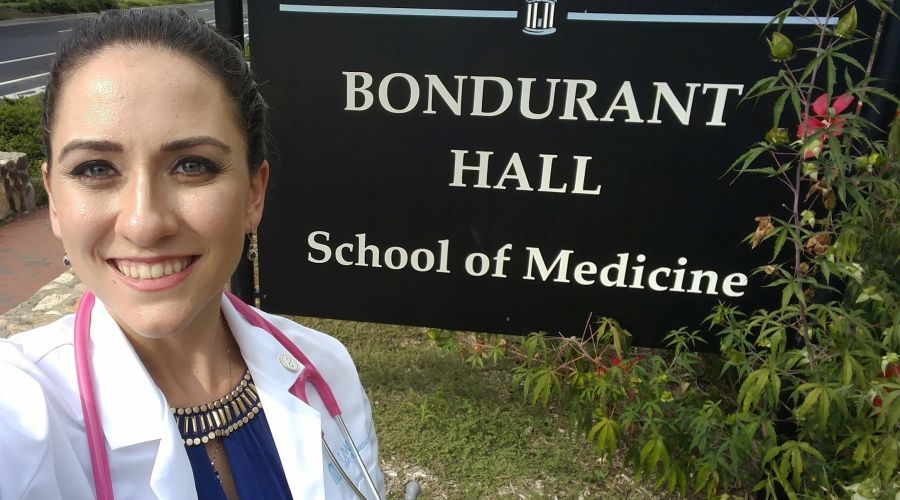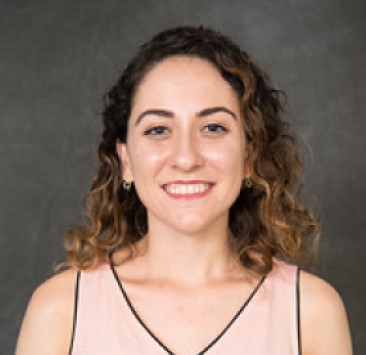
Scholar-Elect Yasemin Cole will study the genomic landscape of paragangliomas, pheochromocytomas and gastrointestinal stromal tumours.
My hope is to identify new patterns which I can study at the NIH which will show the molecular foundations of these devastating neuroendocrine tumours.
Yasemin Cole
Yasemin Cole has always been interested in understanding how the body works. Having supported her cousin through cancer as a teenager, she wanted to know what had caused it and how she could fix it.
As she learned more about human biology she became torn between wanting to pursue a medical calling and wanting to stay in research and find cures to devastating illnesses and conditions.
She has managed to integrate both interests by pursuing a career as a physician-scientist. She will begin a PhD in Medical Science at Cambridge in the autumn halfway through her studies at medical school in the US.
Yasemin [2020] is doing a combined MD/PhD degree and will be studying the genomics of cancer. She will be part of the National Institutes for Health Oxford Cambridge Scholars programme which means she will spend two years of her PhD at Cambridge with Professor Eamonn Maher and two years at the NIH in Maryland with Professor Zhenping Zhuang.
At Cambridge, she will look at the genomic landscape of paragangliomas, pheochromocytomas and gastrointestinal stromal tumours. Through metabolic, epigenetic and functional genomic studies, she will aim to understand their biological underpinnings and why certain mutations lead to cancer. “My hope is to identify new patterns which I can study at the NIH which will show the molecular foundations of these devastating neuroendocrine tumours.”
Understanding how things work
Yasemin was born in Raleigh, North Carolina, to a family steeped in engineering. She has a twin brother who is a computer engineer and both her parents are engineers.
That background gave her an interest in understanding how things work – in her case, the human body rather than the computers her brother was interested in. The twins used to go to science summer camps together and, while Yasemin enjoyed activities such as building a solar panel-powered boat, she was more interested in those which were more focused on human biology.
She knew from middle school that she wanted to study biology, but not where that might lead her. This was cemented when her cousin was diagnosed with medulloblastoma when she was 14 and had to undergo surgery and radiation treatment. She temporarily lost half her motor function when the tumour was removed. “I knew from that time I wanted to understand the biological basis of cancer so I could help individuals like her,” says Yasemin. At the time she didn’t know much about cancer, but she did know that she wanted to understand what had caused it and how to fix it. She was perplexed how cells that were previously normal could suddenly divide out of control.
Yasemin, whose mother is Turkish, was performing Turkish folk dancing at her local Turkish association when she met Nobel Prize-winning scientist Dr Aziz Sancar who was researching cancer at the University of North Carolina School of Medicine. She told him about her interest in cancer and spent her 10th grade summer working in his laboratory. It was her first experience doing proper scientific experiments, working on DNA repair. She really enjoyed it and did work experience the following summer too. The year after, she applied to the National Institute of Environmental Health Sciences summer internship programme and joined a molecular biology laboratory working on the role of the protein coding gene GLIS3 in diabetes. She worked there for two summers before starting and during her biology degree at the University of North Carolina at Chapel Hill.
At UNC, Yasemin worked again with Dr Sancar, this time on the role of circadian rhythms in cancer cells. In the last two years of her four-year degree she became interested in cancer molecular pathways and thus switched laboratories to work with Dr Jeanette Cook on the role of the CDT1 protein in the replication of cells.
Combining medicine and research
In her third year, Yasemin went to a talk about becoming a physician scientist. The talk demonstrated to her that she could have both a career in research and in medicine. The following year she also created and taught her own course on the past, present and future of medicine. Her aim was to show the connection between research and medicine so she focused on how a variety of scientific discoveries had revolutionised medicine. Through the course she came across personalised medicine and genomics and became interested in the role that personalised medicine could play in targeting genetic mutations and dysfunctional proteins.
When she finished her course, Yasemin remained in Dr Cook’s laboratory as a laboratory assistant before beginning a master’s at Imperial College London in genomic medicine in October 2016 (financially supported by the Dean’s Masters Scholarship by the Faculty of Medicine at Imperial College London). Her interest was in how genomics could be applied to cancer. As part of her master’s she took a course which showed how sequencing patients’ genes through the 100,000 Genomes Project could be used to deliver better treatment directly to patients. She witnessed some of the sensitive issues around genomic medicine, for instance, how genetic risk is communicated to patients and their relatives and whether they should get testing if a patient is shown to have a specific mutation.
During the course, Yasemin also did a research project on uveal melanoma, a rare eye cancer which is often diagnosed only after it has metastasised. Her research work culminated in a manuscript which is now under review by a prominent cancer journal. She was interested in whether genomic medicine could help diagnose risk better, leading to earlier treatment. It was at Imperial that her UNC classmate invited her to a Cambridge gathering and she first found out about Gates Cambridge Scholarship programme.
Yasemin returned to the University of North Carolina in October 2017 and worked in Jonathan Berg’s laboratory in the Department of Genetics while applying to medical school. She worked with children with developmental delays who had a clinical suspicion for a genetic condition but were undiagnosed. She tried to match their phenotype with their exome sequencing [the process of sequencing all the protein-coding regions of genes in a genome] to figure out which genes might have mutations and whether certain mutations were more significant than others. To do this, she used computational programming to integrate clinical data, including brainwave activity, with patients’ genomic information. “My aim was to prioritise different genetic mutations which may be the cause of their condition. By using this “phenotype-aware” approach we could use this information to diagnose people more accurately,” she says.
Medical training and voluntary work
In 2018, Yasemin began her medical training at UNC School of Medicine. She has completed her basic medical training coursework and took her first medical board exam in February 2020. This medical training includes three specialty clerkships in OBGYN, psychiatry and paediatrics and she started the first in psychiatry at a state mental hospital in North Carolina in March. Due to the COVID-19 pandemic, however, she has had to switch to a COVID elective instead, focusing on issues such as ventilator use and diagnostic testing. During this time, she is also doing voluntary work with Piedmont Health Services, helping the clinic with follow-up appointments for patients who have had COVID testing.
Yasemin has also been ramping up her work with a refugee family who have lost income due to the pandemic. She helps them to get supplies from community organisations, apply for governmental benefits and collect donations from the community. She has always been interested in how culture and different ideas about health influences people’s well-being, something which stemmed from her multicultural background and led her to minor in medical anthropology as an undergraduate. After seeing the support offered in the UK and knowing what Turkey was doing for people fleeing the war in Syria, she decided to put her knowledge into action. She began working with refugees through Refugee Community Partnership at UNC after returning from London.
She is looking forward to her time at Cambridge and to taking forward her genomic research.

Yasemin Cole
- Alumni
- United States
- 2020 PhD Medical Science @ CIMR
- Darwin College
As an undergraduate researcher at UNC at Chapel Hill and NIH, I gained a broad understanding of biological mechanisms underlying disease, especially cancer. My experiences while designing an undergraduate course, research work, and clinical volunteering sparked my interest in genomics and precision medicine. My coursework and clinical experiences during my master's in genomic medicine at Imperial College London demonstrated to me the potential of precision medicine to revolutionize healthcare. As an MD/PhD student, I will study the genomic landscape of paragangliomas, pheochromocytomas, and gastrointestinal stromal tumors at the NIH and the University of Cambridge. Through metabolic, epigenetic, and functional genomic studies, I hope to elucidate the biological underpinnings of these devastating neuroendocrine tumors, leading to advancements in prognostication and treatment. Outside the lab, I will continue my involvement in scientific outreach/education and refugee health. I am honored to be part of the multidisciplinary and collaborative Gates Cambridge community seeking to improve global society. As a future physician-scientist, I aspire to translate scientific advancements into precision medicine diagnostics and therapeutics.
Previous Education
University of North Carolina Medicine 2026
Imperial College London (University of London) Genomic Medicine 2017
The University of North Carolina at Chapel Hill Biology 2016












